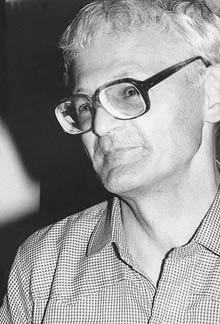CURRICULUM VITAE
Pavel Kogan dutch version
FILMBIOGRAPHY
Filmmaker Pavel Kogan was born in Leningrad, June 9 1931.
He graduated from the economical department of the Leningrad State University in 1957 and the Moscow State Theatre Institute named after Lunacharsky (Gitis) in 1964. While studying in both universities he also worked as a mime actor at Marinka - the Kirov Opera Theatre. Quite by chance he started his career in the cinema production; walking along the Leningrad canals, one day he saw the inscription: Lenkinochronica - the studio of the documentary film production, which became later the well known Leningradskaya Studia Dokumentalnich Filmov.
He has made some thirty films; many of which has been selected and awarded at several international Festivals like Krakow, Leipzig, Amsterdam, Tours and others.His famous film: ‘Look at her Face’, filmed with the help of a hidden camera at the Hermitage Museum near Leonardo’s ‘Madonna Litta’ became very popular and was awarded the Jury Prize at the Leipzig Film Festival and got a diploma at the Tours Film Festival in 1966. This film is considered to be the first example of a new way of making documentaries - the so- called Leningrad New Wave -. Kogan became both the innovator of non-fiction films as well as the classic well known master.
His film ‘The military Music Band’ co-directed by Peter Mostovoy, got the Golden Pigeon (the main prize at the Leipzig Film Festival in 1968)
Two of his films are devoted to the history of his native city Leningrad during the Second World War: ‘City in Siege’ (1969 black/white still-photo’s edited) and ‘The Secret Task’ (1981)“I like the opportunity of making art of life material and of transforming documentary facts into artistic images. The secret of this transformation is still a mystery for me.”
Pavel Kogan was deeply interested in the psychology of his contemporaries and the social processes which take place in modern society.His film ‘Soon comes the summer’ (1987) is devoted to the problems of Perestroika, Glasnost and democracy in Soviet Society.
The film is a combination of satire and tragic comedy and got a special prize in Leipzig.With Dutch co-director Lily van den Bergh, whom he met at the Leipzig Film Festival, he made the first Dutch-Russian co-production ‘Revolt in Sobibor’ in 1989.
They travelled together with a Russian crew (camera man: Sergey Skvortsov) all over the world to interview the witnesses of the most successful, yet totally unknown revolt of Jewish inmates in a Polish death camp in the Second World War. The film got the Second Prize of the Joris Ivens Award at the International Film Festival Amsterdam.Besides documentaries Kogan made three fiction films:
‘The Topic with Variations’ (1974)
‘The House is Build’ (1978) together with Peter Mostovoy
‘The Limit of the Posssible’ (1984/85).
In 1991 Pavel Kogan made his last documentary films:
‘Russian Ballet without Russia’ and ‘Nevzorov’In addition to his film directing Pavel Kogan taught as a professor cinema directing at the Leningrad Academy of Theatre and Cinema and he was for ten years editor-in-chief of the TV program: ‘The Cinema and The Time’.
Unfortunately in 1992 Kogan got a very serious illness. He moved to Israel with his wife Lyudmila Stanukinas, who is a well-known documentary film maker herself.
The award wining filmmaker and friend Victor Kosakovsky made a beautiful film portrait of Pavel Kogan and his beloved wife. Day and night Lyudmila (Lyala) took care of him with an astonishing devotion. Kosakovsky called this lovely documentary: ‘Pavel and Lyala, Jerusalem Romance’ (1998)
Pavel Kogan died that same year, November 3rd, back in his beloved St. Petersburg where he was buried at the famous Komarovo Cemetery.
 Pavel Kogan
Pavel Kogan